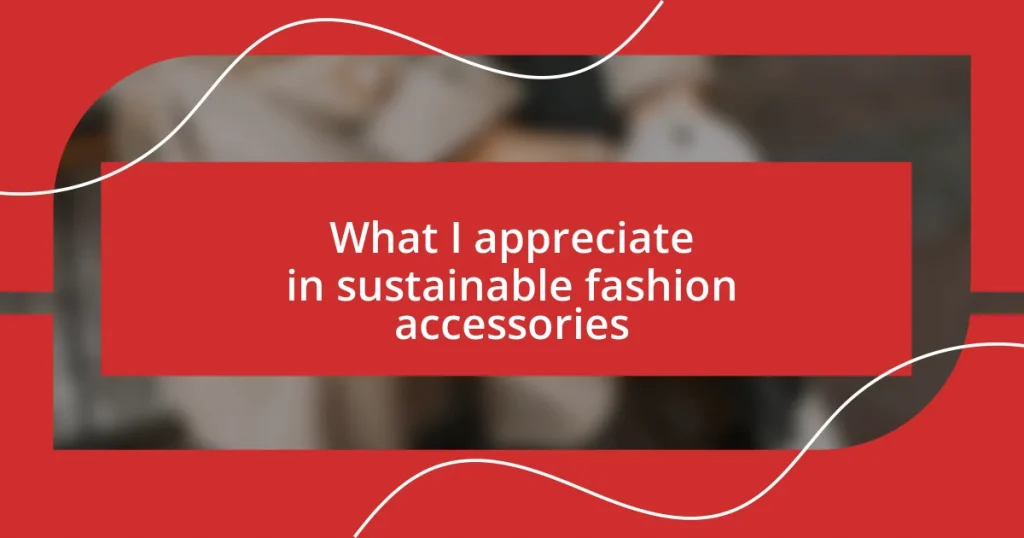Key takeaways:
- Sustainable fashion accessories emphasize ethical craftsmanship, environmental impact, and personal connection to the products.
- Choosing sustainable accessories supports local artisans, promotes longer-lasting quality, and aligns with ethical consumption values.
- Key brands like Stella McCartney, Everlane, and Reformation are leading the way in sustainable practices, showcasing transparency and commitment to eco-friendly materials.
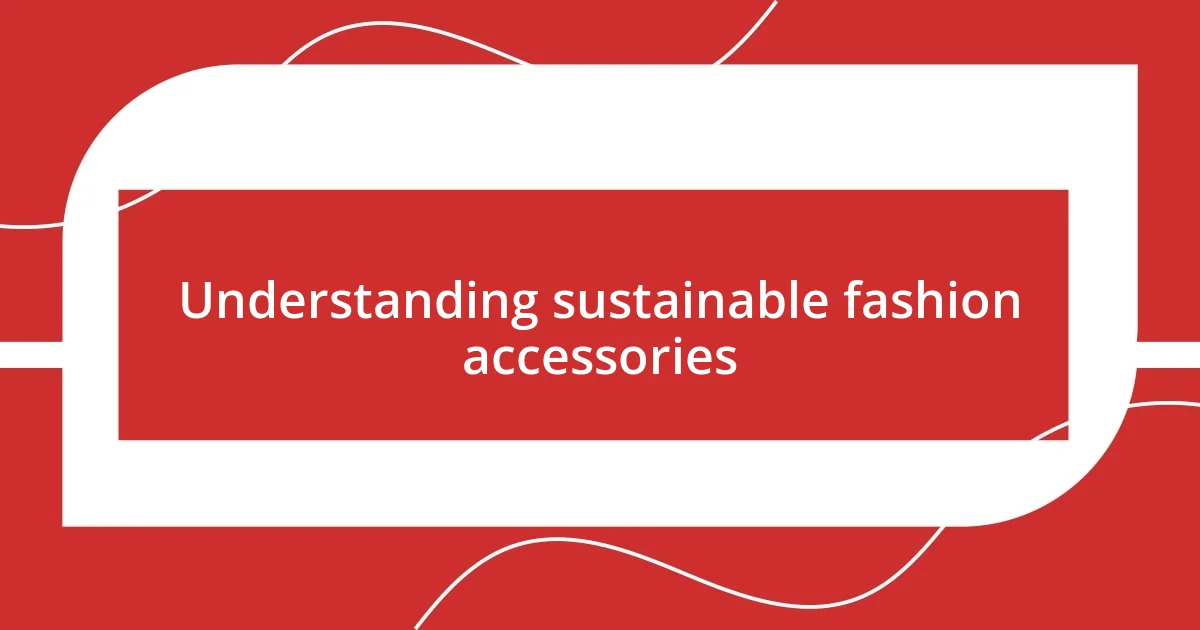
Understanding sustainable fashion accessories
Sustainable fashion accessories are all about rethinking the way we view style and consumption. I remember my first encounter with a handmade, eco-friendly bracelet crafted from recycled materials; the artisan’s story made me realize that every piece tells a tale of sustainability and creativity. This personal connection transformed my perspective on what I wear and where it comes from.
When we consider sustainable accessories, we’re not just looking at the materials used; it’s also about the overall impact on the environment. Think about it: how often do we buy items that are trendy yet contribute to waste? I’ve found that investing in quality, sustainable pieces not only brings joy but fosters a sense of responsibility towards our planet.
Moreover, many sustainable accessories are created through fair trade practices, ensuring artisans receive fair wages for their work. I once wore a scarf made by a collective in India, and it sparked conversations about ethical craftsmanship. Isn’t it beautiful how a simple accessory can act as a bridge connecting us to different cultures and values?
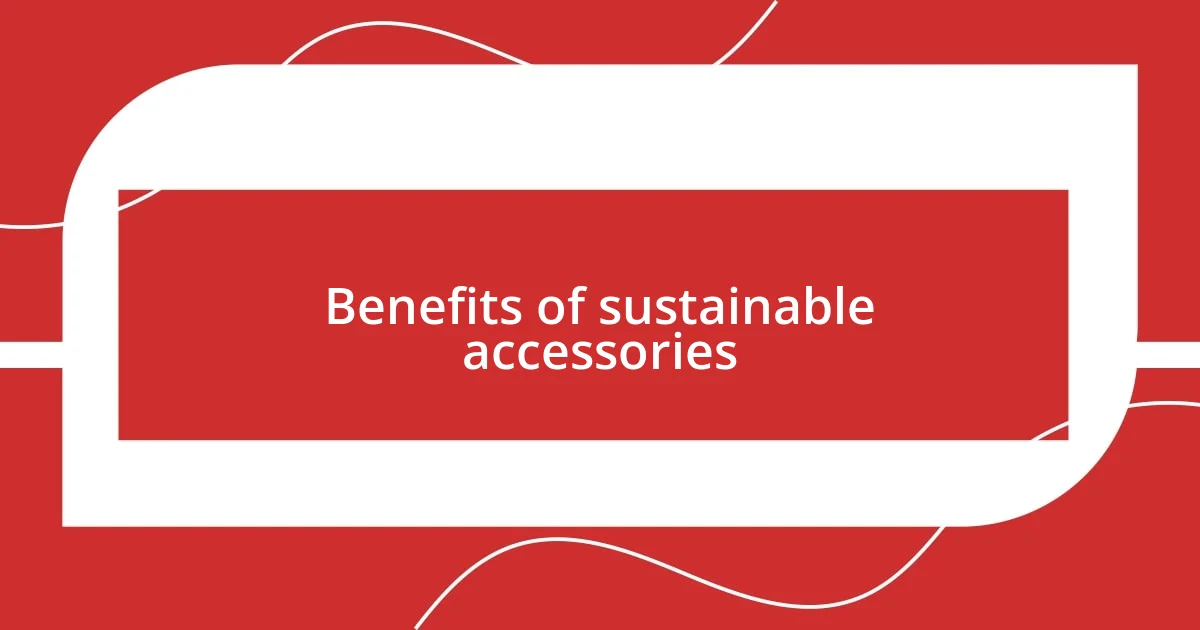
Benefits of sustainable accessories
It’s fascinating how sustainable accessories offer more than just aesthetic appeal; they deliver significant environmental benefits too. I remember purchasing a beautiful tote bag made from upcycled materials. Each time I use it, I feel satisfaction knowing I’m reducing waste and minimizing my carbon footprint. These small changes in our fashion choices can lead to a collective impact that’s hard to ignore.
Here are some benefits of choosing sustainable accessories:
- Reduced Environmental Impact: Sustainable materials often come from renewable sources, which helps decrease pollution and waste.
- Support for Local Artisans: By choosing handmade or locally-sourced items, you’re supporting small businesses and communities.
- Quality Over Quantity: Sustainable accessories are typically designed to last longer, reducing the need for frequent replacements.
- Unique Styles: Many sustainable pieces feature unique designs or artisan techniques, ensuring you stand out in a crowd.
- Ethical Consumption: You can feel good about your purchases, knowing they align with your values and contribute to a better world.
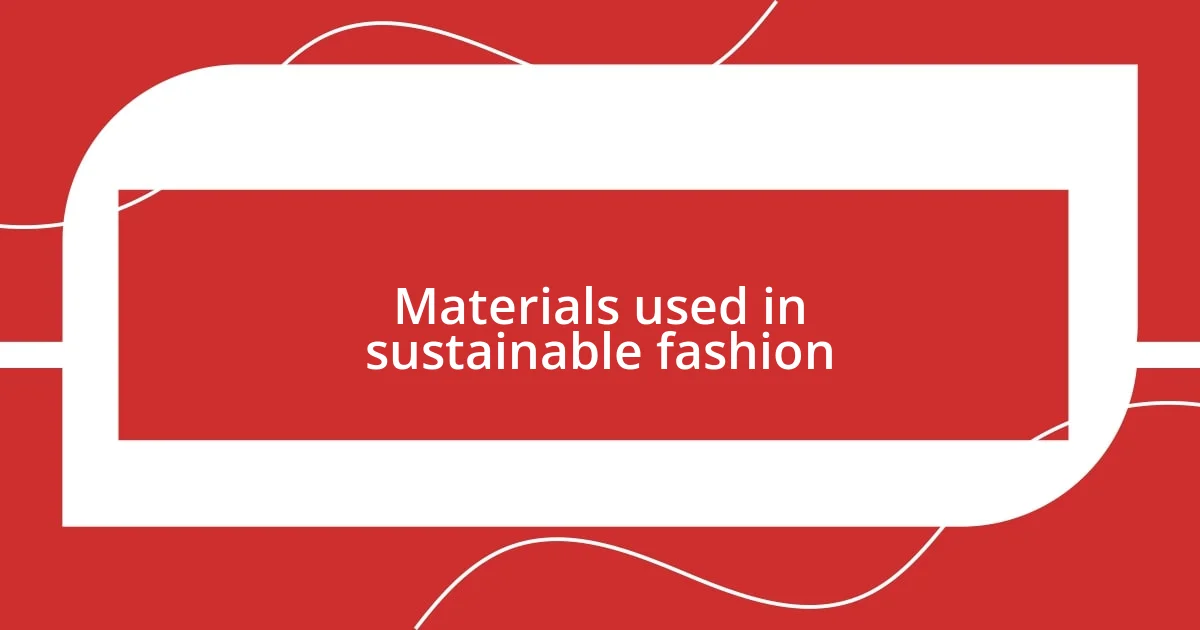
Materials used in sustainable fashion
When discussing materials in sustainable fashion, I often think about organic cotton. Unlike conventional cotton, which requires harmful pesticides, organic cotton is grown using natural methods. I’ve often felt the warmth of a scarf made from organic cotton, appreciating not just its comfort but also its environmentally friendly origin. The joy of wrapping myself in something that feels good and does good is a beautiful experience.
Another fascinating material I’ve come across is Tencel, which is derived from wood pulp and produced using environmentally sustainable practices. Tencel feels incredibly soft against the skin, and wearing a dress made from it genuinely gives me a sense of luxury without the guilt. The thought of supporting a process that prioritizes eco-friendliness adds to my satisfaction whenever I wear it. It’s amazing how such materials can blend comfort with sustainability, isn’t it?
Recycled materials deserve a special mention as well. My favorite bracelet, crafted from discarded plastics, showcases how creativity can transform waste into something beautiful. Every time I wear it, I’m reminded of the need for mindful consumption, and it often prompts conversations about reducing plastic waste. It’s not just an accessory; it’s a statement about the journey toward a more sustainable future.
| Material | Characteristics |
|---|---|
| Organic Cotton | Grown without pesticides; soft and breathable |
| Tencel | Sustainable wood pulp; luxurious feel |
| Recycled Materials | Transform waste into new products; promotes mindful consumption |

Ethical production practices explained
Ethical production practices are essential to sustainable fashion, and they encompass a range of responsibilities that manufacturers must consider. When I learned that some brands pay fair wages and provide safe working conditions, I felt a sense of relief knowing that my purchases could directly support the well-being of workers involved in making fashion items. Isn’t it heartening to think that we can contribute to improving lives with our consumer choices?
One practice that stands out to me is the transparent supply chain. I remember researching a brand that publicly shared the entire lifecycle of their products, from sourcing raw materials to delivery. It not only built my trust in their commitment but also made me feel like I was part of a larger movement advocating for honesty in fashion. Isn’t it empowering to know where our accessories come from and who made them?
Additionally, the use of eco-friendly processes during production, like water-less dyeing techniques or solar energy in factories, often brings a smile to my face. I once came across a small workshop that employed such methods while creating exquisite handbags. Just knowing that their production choices have a lower impact on the planet gives me joy every time I reach for that bag. If we can support brands that prioritize the planet and people, shouldn’t we?
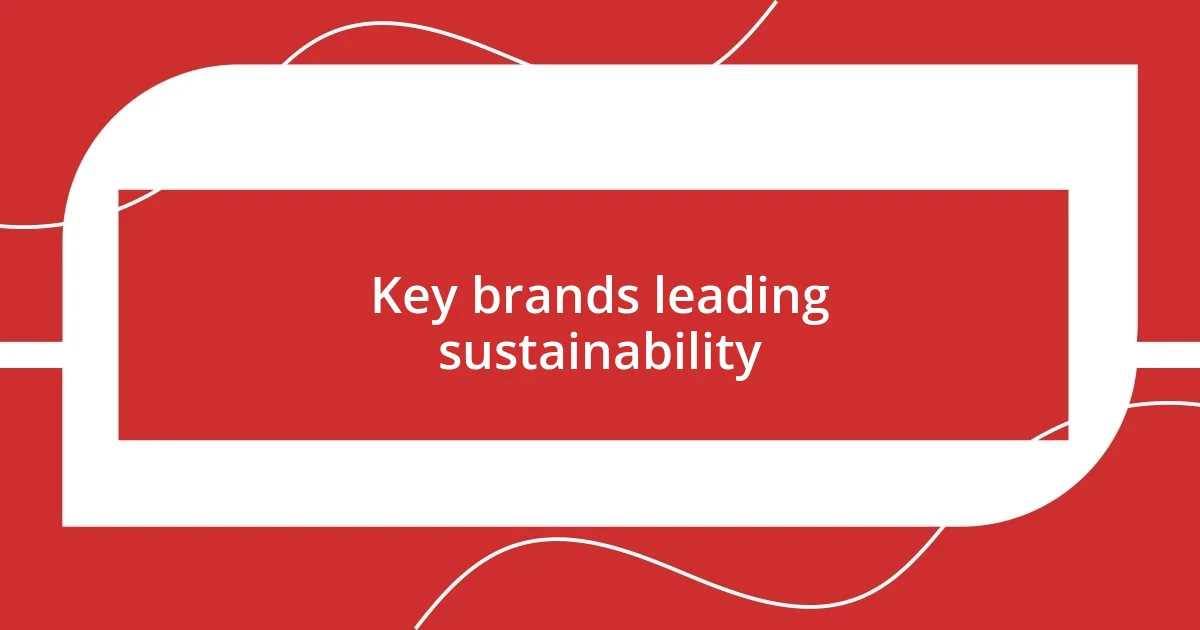
Key brands leading sustainability
When I think about key brands leading sustainability in fashion accessories, a few remarkable names come to mind. For instance, Stella McCartney has long been at the forefront of eco-conscious design. The first time I spotted one of her bags made from recycled materials, I felt an immediate connection not just to the product, but to the ethos it represented. It’s as though I was joining a movement, supporting a brand that champions animal rights and sustainable practices.
Then there’s Everlane, a brand I truly admire for its radical transparency in pricing and sourcing. I remember receiving my first pair of their shoes, knowing that I was part of a larger conversation about fair wages and ethical production. It raised a thought within me: how powerful can our choices be when we support brands that share their stories openly? Every time I put those shoes on, I feel a sense of pride, not just in their style but in the values they embody.
Another standout is Reformation, which I was first introduced to by a friend. Their playful designs made me smile, but it was their commitment to sustainability that truly captured my heart. I found myself excitedly flipping through their website, appreciating how they showcase their environmental impact stats. It made me wonder: how often do we consider the story behind the clothes we wear? Knowing that my choices could contribute to positive changes in the industry gives me hope for a greener future.
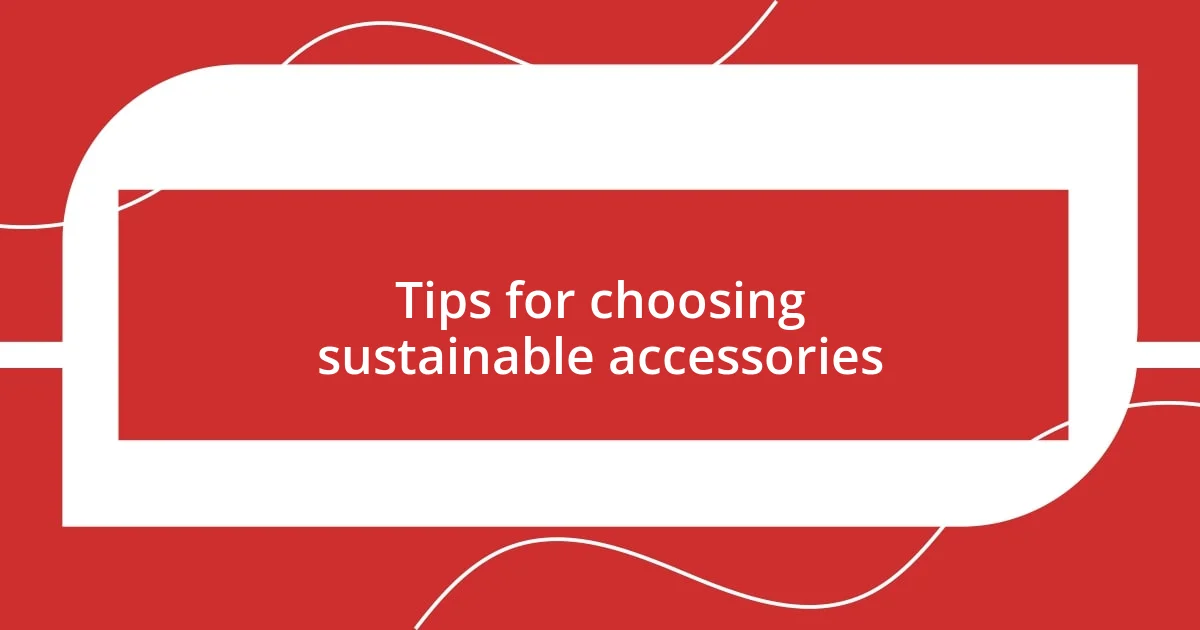
Tips for choosing sustainable accessories
When it comes to choosing sustainable accessories, I always recommend looking for materials that are not only durable but also environmentally friendly. For instance, I recently bought a gorgeous bag made from upcycled materials, and it still blows my mind how creativity can give a second life to items that might have otherwise ended up in a landfill. Have you ever explored the beauty of a product that has a unique backstory? It brings a rich appreciation for craftsmanship.
Another tip is to pay close attention to the labels and certifications. I remember the excitement I felt when I found a necklace that proudly boasted its Fair Trade certification. Knowing that my purchase directly supported ethical practices made me wear it with an extra sense of purpose, as though it carried a little piece of a larger mission. Isn’t it remarkable how a simple piece of jewelry can connect us to a cause?
Lastly, considering the versatility of an accessory can make a big impact. I once invested in a pair of eco-friendly sandals that work beautifully from beach days to casual outings. The joy of knowing I could wear them with multiple outfits, all while supporting sustainable production, truly reinforced the idea that conscious choices lead to a more mindful wardrobe. How do you balance style with sustainability when making your accessory choices?










